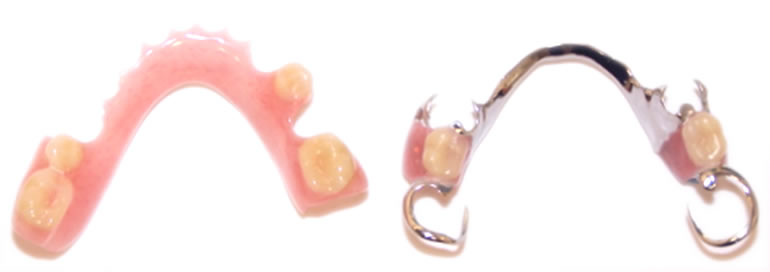Dentures are removable false teeth made of acrylic (plastic), nylon or metal. They fit snugly over the gums to replace missing teeth and eliminate potential problems caused by gaps.
Gaps left by missing teeth can cause problems with eating and speech, and teeth either side of the gap may grow into the space at an angle. Sometimes, all the teeth need to be removed and replaced.
You may therefore need either:
- complete dentures (a full set) – which replace all your upper or lower teeth, or
- partial dentures – which replace just one tooth or a few missing teeth
Dentures can help to prevent problems with eating and speech and, if you need complete dentures, they can also improve the appearance of your smile and give you confidence.
How dentures are fitted
Complete dentures
A full denture will be fitted if all your upper or lower teeth need to be removed or you’re having an old complete denture replaced. The denture will usually be fitted as soon as your teeth are removed, which means you won’t be without teeth. The denture will fit snugly over your gums and jawbone.
However, if you have dentures fitted immediately after the removal of several teeth, the gums and bone will alter in shape fairly quickly and the dentures will probably need relining or remaking after a few months.
Occasionally, your gums may need to be left to heal and alter in shape for several months before dentures can be fitted.
We will take measurements and impressions (moulds) of your mouth, and then order your full or partial dentures from a dental technician.
A trial denture will be created from the impressions taken of your mouth. The dentist or clinical dental technician will try this in your mouth to assess the fit and for you to assess the appearance. The shape and colour may be adjusted before the final denture is produced.
Partial dentures
A partial denture is designed to fill in the gaps left by one or more missing teeth. It’s a plastic, nylon or metal plate with a number of false teeth attached to it. It usually clips onto some of your natural teeth via metal clasps, which hold it securely in place in your mouth. It can easily be unclipped and removed.
Occasionally, the clips can be made of a tooth- or gum-coloured material, although this type of clip isn’t always suitable, because it tends to be more brittle than metal.
Your dentist can measure your mouth and order a partial denture for you, or you can see a qualified clinical dental technician, who can provide a partial denture for you directly after you’ve first seen your dentist for a treatment plan and certificate of oral health.
How to look after your new dentures
General
- Wearing new dentures can be extremely difficult at first
- It will take time and perseverance to get used to them
- You should not expect too much from them too soon
Eating
- Initially cut your food into small pieces and don’t be too ambitious!
- Food will tend to trap underneath your dentures at first
- Try to leave the dentures in during meal times as much as possible and you will quickly get used to chewing with them in place
Speaking
- May be difficult for the first few days but will quickly improve
Cleaning
- Dentures should not be worn overnight
- They should be cleaned in the morning and night time using washing up liquid and a toothbrush
- You should clean any remaining teeth in your mouth while the dentures are removed with a separate toothbrush and toothpaste
- Your dentures should then be soaked overnight in either Milton or Sterident
- If your denture has metal pieces, leave it soaking in Corsodyl mouthwash (1 capful mixed with water.)
Looseness
- New dentures are often loose to begin with, especially the lower ones
- It will take time for the tongue and cheek muscles to get used to the shape of the new dentures.
- To help the dentures stay in place in the early stages, you can place a small drop of either fixadent or polygrip on each denture to help hold them in place until the muscles adapt.
Discomfort
- You can expect to experience some discomfort at first from your new dentures
- If the discomfort is mild, try to persevere with dentures as much as possible
- telephone the practice to arrange a new appointment
- try to wear the new dentures for at least 2 days before your appointment to help your dentures see where the dentures are rubbing.
- Use hot salt mouthwashes – 1 teaspoon of salt dissolved in hot water – 3 times a day to help the ulcers heal up.
If you are concerned about your dentures or have any further questions, please call (01475) 741186 and ask to speak to a Dental Nurse
Removable Dentures
What are they?
A removable denture replaces missing teeth. “Partial” dentures replace a few missing teeth and “full” or “complete” dentures are needed if all of the natural teeth are missing.
Complete dentures are best made of acrylic (plastic). Partial dentures can also be made wholly of acrylic. Alternatively, they can be made of acrylic teeth on a metal base. This type of denture is more secure and less bulky, but is also more expensive.

What will my dentist do?
It normally takes 3 to 4 visits to the dentist to make your denture.
At the first visit, the dentist will use a putty like material to make moulds of your mouth. These are called impressions. A dental technician will then use them to make models for the denture to be built on. Sometimes, a second, more accurate set of impressions are taken to make sure your denture is a good, tight fit.
The technician will then makes wax blocks which are used to record the position of your jaws in relation to each other, and shows the technician the shape to make your denture.
A trial denture is then made and put in your mouth. The dentist will ask you how it fits, feels and looks before making any final changes.
The trial denture then goes back to the technician who permanently fixes the teeth. The denture will then be ready to be fitted in your mouth. You will be given a written set of instructions telling you how to look after your new denture. The dentist may need to see you again a few weeks after having your denture fitted to make small adjustments.
What are the benefits?
If you have lost some teeth, dentures can improve the way you look, bite, chew and speak.
They are custom made for your mouth and are made to look as natural as possible.
Dentures can be fitted immediately after teeth have been taken out so that nobody will know that you have had a tooth out. These are called immediate dentures.
Dentures will never feel like your own teeth and it can take time to get used to them, especially if you haven’t worn a denture before.
“Big thanks to lovely Lyall for calming my nerves and being very understanding during my treatments over the last few months, so nice and always checking I was ok! Highly recommend!”
Lynne Guthrie
Please call us on 01475 741 186 or click here to book an appointment, or click here for our services.

Contact Us
Opening Times
| Monday | 0830 – 1830 |
| Tuesday | 0830 – 1830 |
| Wednesday | 0830 – 1830 |
| Thursday | 0830 – 1830 |
| Friday | 0830 – 1645 |

